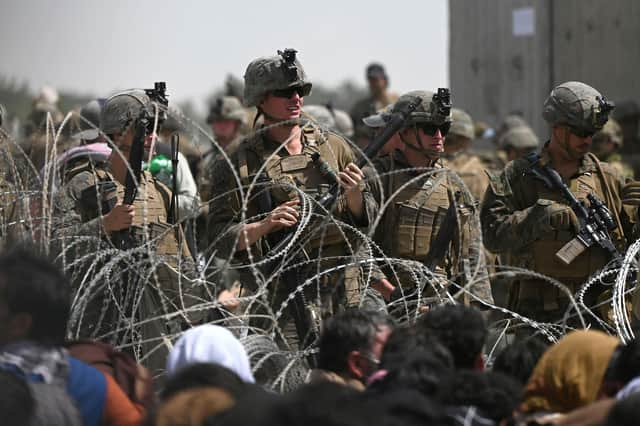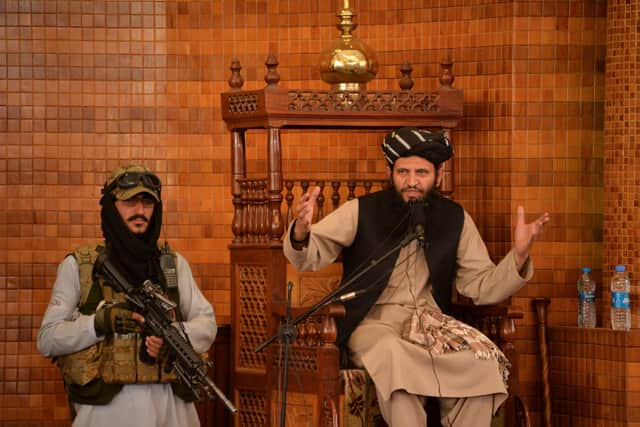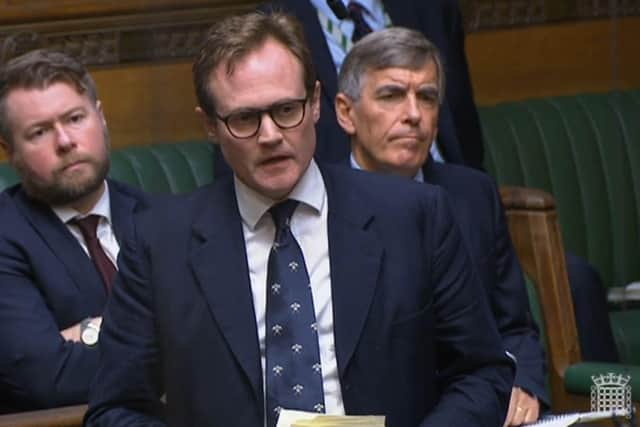Afghanistan: UK must not compound its mistakes by deserting refugees fleeing the Taliban – Christine Jardine MP


Sitting on the Commons’ green benches listening to MP Tom Tugendhat’s account of the emotional trauma that he and other Afghan veterans have suffered watching that country being abandoned by the West was one of those moments for me.
The already tense atmosphere was heightened to breaking point as his, at times strained, address underlined the severity of the personal crisis so many individuals now face.
And not just in Afghanistan.
Advertisement
Hide AdAdvertisement
Hide AdThe tears which had threatened since the weekend overwhelmed me as he told how he could not forget the image of a man whose name he never knew, carrying a child who had died hours earlier into his firebase and begging for help.
There was nothing he or his colleagues could do.
An overwhelming desire to help


It was, he told us, what defeat looks like. When you no longer have the choice to help.
That hopeless, heart-breaking image reflected exactly what so many of us in that recalled House felt on Wednesday.
The horror of the war in Afghanistan has never seemed so real to me as it did in that moment. The desire to help so overwhelming. The realisation that it was too late so enormous.
There were only a handful of speakers who did not concur with the view that this is a humanitarian disaster that could, and should, have been avoided. That the many millions of people, women and girls especially, who will now have the freedoms they have come to cherish over two decades snatched from them, deserved better.


My email inbox is overflowing with constituents’ appeals for me to press the government for more help for those whose lives the West has now placed under threat.
Most agree that the 5,000 places to be offered to refugees in the current year is inadequate.
And while the eventual 20,000 places are welcome, how do we expect those afraid for their lives to wait for up to five years?
Advertisement
Hide AdAdvertisement
Hide AdBlind dogma, not political strategy
That frustration reached new heights when it was revealed that the Foreign Secretary, Dominic Raab, had not responded to advice to speak to his counterpart in the Afghan government before Kabul fell. That those who could have helped had not taken the opportunity to do so seemed beyond belief and added yet another chapter to the litany of mistakes and damaging incompetence of this Johnson administration.
The response of the Prime Minister himself when he spoke to the chamber seemed inadequate to assuage the anger, even of those on his own benches.
And the adherence to the cut in international spending, as we see our interests being undermined and our security come under threat, feels now like blind adherence to dogma rather than political strategy.
Sitting on those green benches this week, it was abundantly clear to each of us that we now face an international challenge of immense proportions.
Afghanistan has historically played a critical strategical role in the international system, most recently when the failed ten-year occupation by the Soviet Union was the prelude to that empire’s decline.
Safe-passage corridor
Now we face the possibility that the US may no longer be prepared to accept the responsibility of policing the system that goes with leading the defence of western democratic values.
US domestic politics and public opinion, always an important consideration for American presidents, may now be a defining and limiting factor on the foreign policy of the self-proclaimed leaders of the free world.
What we must do immediately is open our national doors to those whom this failure has placed at risk.
Advertisement
Hide AdAdvertisement
Hide AdOver the past week we have seen increasingly desperate scenes at Kabul airport.
Taliban checkpoints all over the city have made many fearful of leaving home in case the journey is their last.
Safety from the feared tyranny of the regime should not just be for foreign nationals, or the lucky few who made it in time to exit points across the country.
A safe-passage corridor may offer an escape route, and the government must make it their top priority to make efforts to secure such a route with allies.
But they must also make sure our councils have the funding to ensure that their increasingly stretched resources can cope with a share of the asylum seekers.
Politicians ‘responsible for the consequence’
Perhaps one of the few saving graces of this situation is the feeling of common purpose and cross-party solidarity which pervaded Westminster this week.
There is also a growing realisation that we must not compound the mistakes already made by deserting the Afghans now but try to exercise what positive influence we can on their future.
The Taliban have made many contradictory statements in the past week about their rule will mean.
Advertisement
Hide AdAdvertisement
Hide AdWe do not yet know what the reality will be, but I believe that we will have to judge them on the evidence of the actions we see over the coming months and act accordingly.
Afghan veterans speaking on the media express the same anguish of which Tom Tugendhat spoke: the fear that their sacrifice and the loss of their friends has been for nothing.
When the dust settles, I suspect that the words which will most appropriately sum up where we are came on Wednesday from former Prime Minister Theresa May when she said: “All our military personnel, all who served in Afghanistan, should hold their heads high and be proud of what they achieved in that country over 20 years, of the change of life that they brought to the people of Afghanistan and of the safety that they brought here to the UK.
“The politicians sent them there. The politicians decided to withdraw.
“The politicians must be responsible for the consequences.”
Christine Jardine is the Scottish Liberal Democrat MP for Edinburgh West
A message from the Editor:
Thank you for reading this article. We're more reliant on your support than ever as the shift in consumer habits brought about by coronavirus impacts our advertisers.
If you haven't already, please consider supporting our trusted, fact-checked journalism by taking out a digital subscription.
Comments
Want to join the conversation? Please or to comment on this article.
